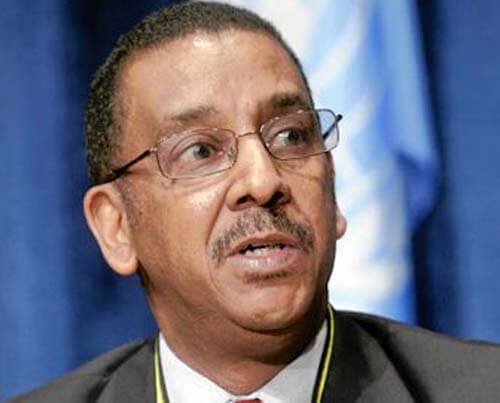Caribbean Community (CARICOM) states on Nov. 29 voted overwhelmingly with the rest of the world to grant Palestine Non-Member Observer State status at the United Nations.
They also expressed the urgent need for the resumption of negotiations between Israel and the Palestinians leading to a permanent two-state solution.
The resolution on the status of Palestine in the UN was adopted by a vote of 138 in favor to nine against, with 41 abstentions, by the 193-member General Assembly.
Antigua and Barbuda, Belize, Dominica, Grenada, Guyana, Jamaica, St. Kitts and Nevis, St. Lucia, St. Vincent and the Grenadines, Suriname, and Trinidad and Tobago voted in favor.
While no CARICOM-member state voted against according Palestine Non-Member Observer State status, three CARICOM states – Bahamas, Barbados and Haiti – abstained.
Other nations that voted against the accord were Canada, Czech Republic, Israel, Marshall Islands, Federated States of Micronesia, Nauru, Panama, Palau and the United States.
Equatorial Guinea, Kiribati, Liberia, Madagascar and Ukraine were absent for the vote.
Jamaica said it voted in favor of the resolution based on a “firm commitment to a just and lasting peace in the Middle East region.
“Such a peace could only be brought about by a negotiated settlement,” said the island’s UN Ambassador Raymond Wolfe.
He said Jamaica sought a balanced approach to the issue, which recognized, among other things, Israel’s right to exist.
In its view, Jamaica said the granting of Non-Member Observer State status to Palestine was on the same level as the status afforded to the Holy See delegation, noting that it was not equivalent to membership in the United Nations.
“The moment has arrived for the world to say clearly: enough of aggression, settlements and occupation,” said Mahmoud Abbas, president of the Palestinian Authority, as he called on the 193-member body to “issue a birth certificate of the reality of the State of Palestine”.
He charged that following Israel’s “latest aggression against the Gaza Strip,” the international community now faced “the last chance” to save the long elusive two-state solution, adding: “the window of opportunity is narrowing and time is quickly running out.”
“We did not come here seeking to delegitimize a State established years ago, and that is Israel; rather we came to affirm the legitimacy of the State that must now achieve its independence, and that is Palestine,” Abbas told the General Assembly before the vote.
He said the world was being asked to undertake a significant step in the process of rectifying the “unprecedented historical injustice” inflicted on the Palestinian people since 1948.
“Your support for our endeavor today will send a promising message – to millions of Palestinians on the land of Palestine, in the refugee camps both in the homeland and the Diaspora, and to the prisoners struggling for freedom in Israel’s prisons – that justice is possible and that there is a reason to be hopeful and that the peoples of the world do not accept the continuation of the occupation,” Abbas said.
Israel’s Ambassador to the UN, Ron Prosor, said his delegation could not accept the resolution.
“Because this resolution is so one-sided, it doesn’t advance peace, it pushes it backwards,” he said adding that peace could only be achieved through negotiations.
“There’s only one route to Palestinian statehood and that route does not run through this chamber in New York. That route runs through direct negotiations between Jerusalem and Ramallah that will lead to a secure and lasting peace between Israelis and Palestinians,” he added. “There are no shortcuts. No quick fixes. No instant solutions.”
The Israelis and Palestinians have yet to resume direct negotiations since talks stalled in September 2010, after Israel refused to extend its freeze on settlement activity in the occupied Palestinian territory.
“Today’s vote underscores the urgency of a resumption of meaningful negotiations,” said UN Secretary-General Ban Ki-moon after the vote was finalized.
“We must give new impetus to our collective efforts to ensure that an independent, sovereign, democratic, contiguous and viable State of Palestine lives side by side with a secure State of Israel,” he added. “I urge the parties to renew their commitment to a negotiated peace.”
Addressing the same gathering, the President of the General Assembly, Vuk Jeremic, appealed to “my dear friends from Palestine and Israel” to work for peace, to negotiate in good faith, and ultimately, to succeed in reaching the historical settlement.
“I have no doubt that history will judge this day to have been fraught with significance – but whether it will come to be looked upon as a step in the right direction on the road to peace will depend on how we bear ourselves in its wake,” he said.
“Let us, therefore, have the wisdom to act in furtherance of the goal I’m sure we all share,” he added.
In the resolution, the General Assembly also voiced hope that the Security Council will “consider favorably” the application submitted in September 2011 by Palestine for full UN membership.
The Palestinian bid for full UN membership stalled last year when the 15-nation Council, which decides whether or not to recommend admission by the Assembly, said it had been “unable to make a unanimous recommendation.”
Thursday’s action came on the same day that the UN observed the annual International Day of Solidarity with the Palestinian People.
Established in 1977, the day marks the date in 1947 when the General Assembly adopted a resolution partitioning then-mandated Palestine into two states, one Jewish and one Arab.


























